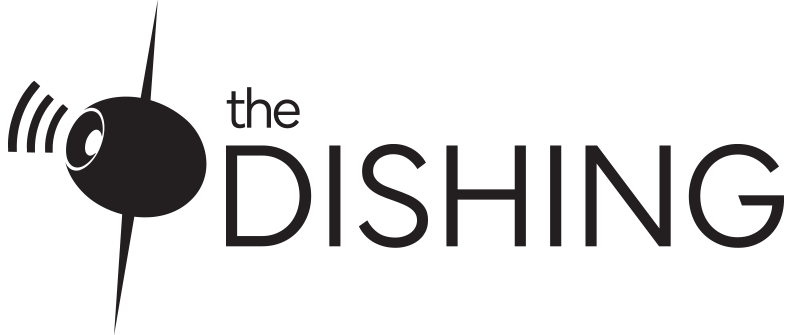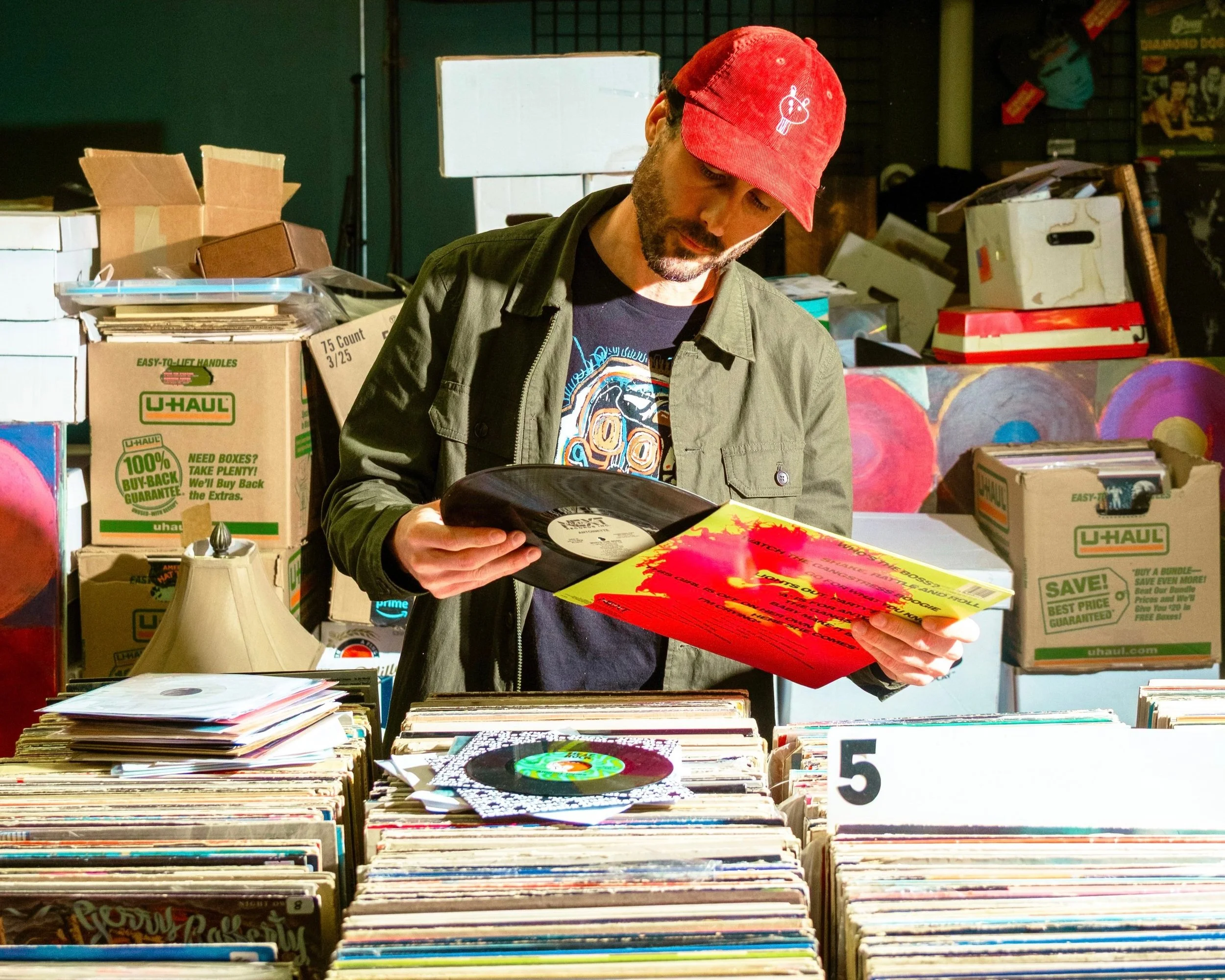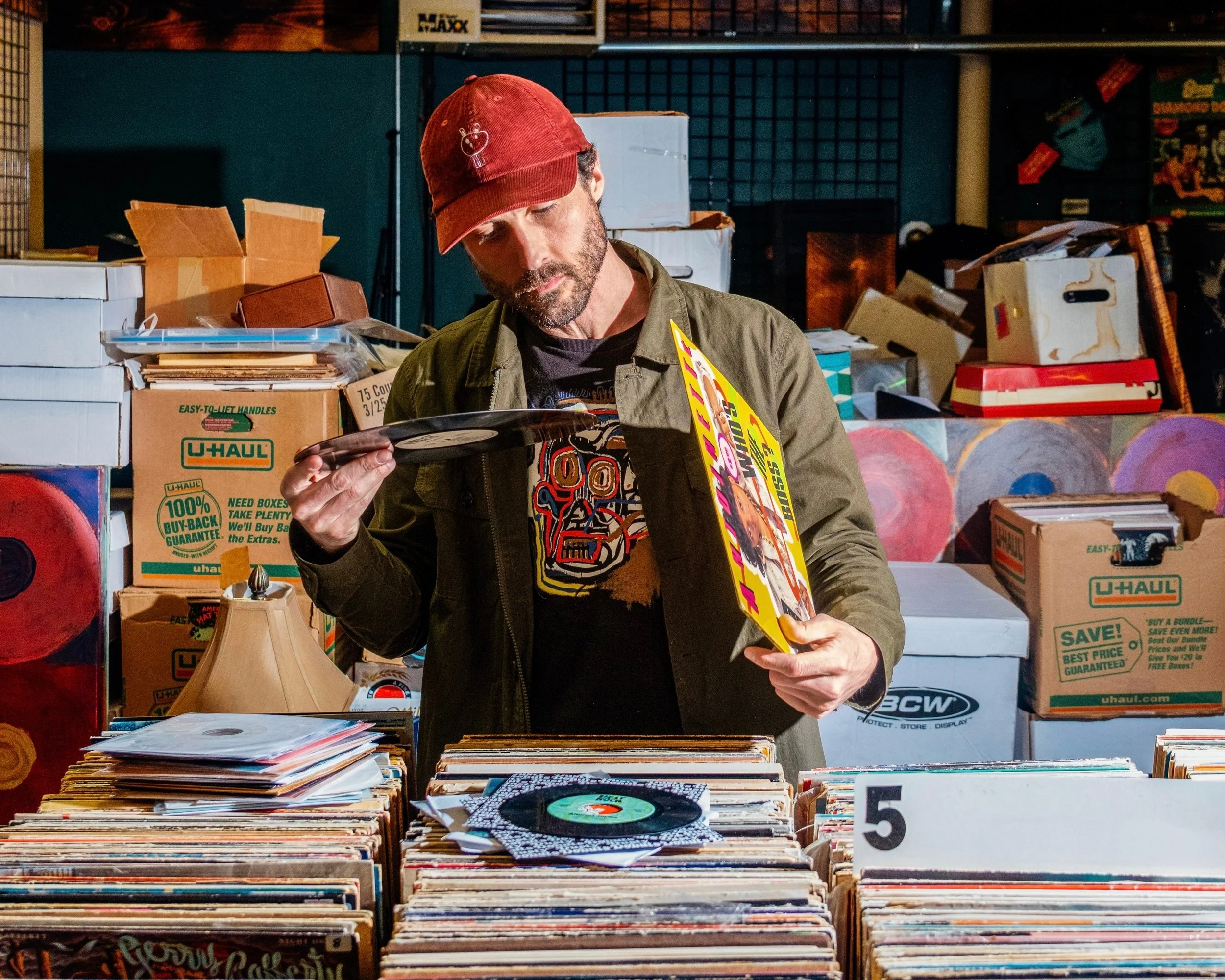MEET: DJ + producer OKTAH
Oktah. Photo: Victoria Sedefian/The Dishing. On location at Sweet Side Records, Glens Falls.
Collin Badger, the creative behind Oktah’s sound + vision, talks records, audio + visual art, the future of DJing + his favorite Chinese spots in Glens Falls.
Interview: Susie Davidson Powell
Photos: Victoria Sedefian/The Dishing
Location: Sweet Side Records, Glens Falls N.Y.
_________________________________________________________________________
Tastemaker: Oktah a.k.a. Collin Badger
Business: Oktah| IG: @oktahmusic | Twitch: twitch.tv/oktah
Hometown: South Glens Falls, NY
Current city: Glens Falls, NY
Personal style: I’m a bit of a traditionalist. I was an Air Max 95 kid, collecting Air Max 95s as a Nike guy, and now Skater Vans. I guess street style, Scotch & Soda and, I used to spin at Burton when I was in Burlington, so Burton (snowboard) rider clothes as well
Listening to right now: Yeah, there’s a DJ out of UK called Chris Read, tribute mixes, golden era soundcloud mixes of hiphop, funk mash ups. Overseas 45 pressings are my jam lately.
Favorite spirit: Rum
Favorite classic cocktail: Mai tai
Listen to VAPORADE, a custom playlist by Oktah x The Dishing, a So Cal, lo-fi summer playlist on Spotify.
Oktah. Photo: Victoria Sedefian/The Dishing.
Collin Badger, a.k.a. Oktah, is a creative director, DJ, and record collector based in Glens Falls in upstate New York. Oktah (formerly known as Midas) co-founded Sub-Bombin Records, an indie beatstrumental, hip-hop and electro-pop record label in the 518 area with his friend Rawhead the Wreckloose, championing underground hip-hop and nurturing a unique musical scene for a decade. The label curated a roster of over ten artists and collaborated with Phantogram, Gary Wilson, Mr. Complex, and many local 518 artists. With nearly 20 years of experience behind the turntables, Oktah has shared the stage with acclaimed acts such as J-Live, Homeboy Sandman, Dres from Black Sheep, Jarobi from A Tribe Called Quest, Ed OG, Mr. Complex, and Pharoahe Monch. He was also creative director for renowned Black Star emcee Talib Kweli and J-Live.
Collin, thanks for talking with me today. Your logo is this vivid yellow, vinyl record with digital tentacular arms. Can you describe Oktah and the vision behind the name?
Sure. The logo kind of came about in the sense of obviously everything was record centric from a music perspective, but also multifaceted in the sense that I've produced music, I've spawned music, I've mixed music, I've collected music. So the idea behind the tentacles was a multifaceted approach to music with the obvious being the core: records and more of a tactile analog style of what I listen to, and how I collect which crosses funk, hip-hop, instrumentals, and reworks. [Ed. note: As a dedicated record collector, Oktah possesses a unique 45s collection and a vast array of records sourced from around the world.]
OK. By day, you’re a lead designer for Harvard Medical School, but by night - or early evening, 6-8pm - you’re often livestreaming on Twitch. You also shared a summer playlist with The Dishing for which you designed the cover art. What took you from art to music or have they always been entwined?
So I always grew up around music, with my folks, with a track player, and you know, not necessarily the same taste as myself, but I grew up also with art always in the house, and I always was into art all the way up through elementary school, to high school, and even into college. That's where I really knew my calling was and marrying the two was just this kind of natural feeling in the sense that you can do both and they have connected tissue where the visual art also matches the auditory ascent as well.
The bug really hit me in college (SUNY Oswego) with some of my roommates. We were producing a lot of music and eventually I got into DJing which led to me creating the record label and getting more into creating releases but also creating the artwork that goes alongside of them. Not only did I executive produce some of the albums that were going out but also created the artwork for those. Think of Blue Note records with Reid Miles and Francis Wolff as the photographer, that's kind of the essence I really wanted to portray with Sub-Bombin and when I was doing that, as well as, you know, similar to Stone's Throw records with Jeff Jank as their art director as well. So they were some of my inspirations in terms of albums and labels with art and music.
You co-founded Sub-Bombin Records in 2005 with Rawhead the Wreckloose mostly championing underground hiphop, but also collaborating with artists like synth-pop, international headliners, Phantogram from Saratoga Springs. You shut down Sub-Bombin in 2015. How would you sum up that decade and the lessons learned?
It was a really exciting time in the sense of really what we really tried to do. The label kind of birthed itself out of a radio show at Skidmore College which then turned into finding like-minded friends and extended friends with“ wow, we have quite a little indie hip hop beat instrumental scene around here. How can we kind of cultivate that, nourish it, and lift it up?” And that was the whole premise behind Sub-Bombin and we started to collaborate with local artists and it got to be more networking so we built beyond that. That's where we met Josh and Sarah doing shows and we’d book shows with them, and then meeting others throughout that journey. I think one of the learnings through building the label was really about networking and building relationships. That was a huge part of it. We met a lot of really amazing people and that was one of my big takeaways, even as we shut the doors down in 2015. I think what really came out of that were enriched relationships and amazing friendships that came out of it. Yeah, ultimately, if we have anything to show for that time, it’s what we got out of it. And that's a win for me.
Oktah. Photo: Victoria Sedefian/The Dishing
Absolutely. What do you see as the future of DJing, whether online, in clubs, in restaurants, or other shifts in how people go out?
The pandemic was a big one for me and there were a lot of learnings where I actually used to play out quite a bit, and with shuttering the label that kind of shut a lot of opportunities down. So when the pandemic occurred there was a big shift in terms of how people could get their music out there as well as working with the constraints of bars not always being open to certain genre types or, even, you know, getting compensated properly for the actual craft of DJing. So it closed doors, but it also opened doors and inroads for some of the DJs who socially didn’t necessarily want to be out and about in the wee hours of the morning, but really wanted to get their niche listening experience out there to let folks hear what they had to say via their playlists, and tastes – like certain genres that weren't being addressed.
As far as I was concerned, that was a really interesting time for me and it opened up exponential DJ experiences whether through video, DJing, or incredibly targeted, curated sets which would not normally be thought of in a public setting or bar where it's a little bit more mainstream. So where I think we're heading is that you’re going to see a lot more of these targeted, curated sets, where it's a specific niche. Not a kind of a broad blanket that you can throw over in terms of genre and hope people listen. The whole goal of my DJing purpose is to let people hear something that they're not going to hear at home. If you can put it on your Spotify playlist at home, I won't necessarily be for you, right? Like, I want you to come out and be like, "Wow, I've never heard that before. Where can I hear that again?” It's more in the moment, hearing that experience, and then taking that elsewhere. That's kind of where I see things happening in terms of music experiences that can't be curated week over week, day after day. It's a one off and a special moment in time.
I write about restaurants, but I believe sound is essential to the dining experience whether a cafe, bar, restaurant, for setting the vibe. Recently, we’re seeing more restaurants hiring DJs to attract a crowd, but we also see nightclubs closing. As a DJ for over 20 years, your career has spanned this transition. How do you view this change? Are late night clubs dead?
I guess the pessimist in me is going to say potentially the traditional nightclub is going to be more rinse and repeat, right? However, where I think there's a silver lining in all of this is to your point of restaurants bringing in a curated DJ for an experience – maybe not night after night for the traditional dining experience, but as a themed event, such as a brunch or a prefix dinner, wine pairing party. That has a very high probability of happening. I think that even as a DJ from the music side and not being on the food side of the house, I think that would be an exciting endeavor to realize these people are coming for an experience. They're not here for your average, day after day, playlist after playlist, song after song or what they're being fed through their algorithms.
We live in upstate New York which can be a little bit interesting, but I am a firm believer that what's happening with some more forward-thinking establishments, from a food perspective, pulling in specific music folks is a really interesting way to bring in bodies, bring in people that really want great food, great music, and a great experience, and something they're going to talk about when they leave. That's what builds a following and great communities. It's all symbiotic, right?
The pandemic pushed a lot of DJs online. (I used to tune in for D-Nice and Quest Love during the lockdown.) How important is the live online format, like Twitch, Instagram live stream, Discord etc., to you and other DJs now?
Yeah, I mean, honestly, I think it's really important in the sense we have an outlet where if we can't book specifically in our local region or get bookings in other cities, it's a really nice way to get the message out and continue to monetize what we do. But also get the word out about what we’re listening to, what's new, and what's hot in terms of music currently. So I think it's a vital part of DJing as well as the in-person brick-and-mortar experience still being a vital part. We're not quite there but I think both can work together.
Oktah. Photo: Victoria Sedefian/The Dishing
OK, pop quiz. I’ll name some artists. You give me your reaction in one or two words.
SDP: Skrillex.
Oktah: Uh.
SDP: …Wait, that's it? Uh. [Laughs] OK, got it. Let’s move on. How about Mark Ronson?
Oktah: Uh, dabble.
SDP: Taylor Swift?
Oktah: Mainstream.
SDP: Fat Boy Slim?
Oktah: Classic.
SDP: J Dilla?
Oktah: Super classic.
SDP: De La Soul?
Oktah: Legendary.
SDP: DJ Trumastr?
Oktah: My man!
Who has been your biggest musical or DJ influence?
Ooh, okay. Musical inspiration, I would say, obviously J Dilla is a big one. Still have his obit from the New York Times. Yeah, Dilla has been huge, and Tribe Called Quest, of course. Pete Rock, as far as DJs go, I’d say Scratch Bastid has been a huge influence. And DJ Cocoa Kashimokita and DJ Mr. Thing. Also, Tru, like, as a local DJ. It's funny – I think I was DJing longer than Tru, but he’s actually honed his craft much stronger than I have in terms of what he's doing. But Tru’s been an amazing support system. And then my really good friend, Michael, who's Rawhead the Wreckloose, has been one of my biggest inspirations in terms of music. He's a producer more than a DJ. He was my co-founder with Sub-Bombin and a huge influence on me as well.
Perfect. Let's shift to other tastes. You grew up in South Glens Falls, and you live in Glen Falls now. Did you grow up in a home where cooking was important? What are your childhood memories of food or dining out?
Yes, shepherd's pie was huge in my house with my mom. That was my cozy meal. It might be an off the grid dish, but that was one of my favorites. I grew up in a nice neighborhood and all my friends were close so it was really fun. Pretty typical suburban youth with a lot of hockey which is a big part of my life as well as music. As far as memories of going anywhere in particular… Young's Chinese restaurant was the best. It was the noodles, the mustard, the duck sauce at the table with the tea. That was locally here in Glen Falls when I was a kid. We used to go there all the time. Also, we used to go to the hibachi table at Mikado when it was in its old location. That was always the birthday spot. I always wanted to do the hibachi when we were kids… it was fun to watch them do all the performative food stuff.
So, what are your favorite spots in the 518?
I'll give the breakfast nod to Sweet Mimi's on Phila Saratoga which is always a jam. Mint, and Farmacy are really good around here (Glens Falls) as far as favorites. Also Seneca is one of my favorites in Saratoga. And Golden Monkey is great for cocktails as far as, like, a chill lounge spot here in Glens Falls too. Like that's where I would go.
….And Young’s Chinese?
That’s actually defunct now, but I do love Lam Fong Yuen Chinese (South Glens Falls.)
Oktah. Photo: Susie Davidson Powell/The Dishing
Nice. Think about your ideal night out anywhere. If we've taken care of the cost and reservations, would it be kicking back, listening to music, or dinner and hitting a club?
I'm gonna kind of rewind back to my days in Burlington. It would be to go out to a lovely dinner at either Hen of the Wood in Vermont with, like, really nice, great wine, great dinner entrees, and then head potentially to the Barcade or to one of the smaller venue spots, like Signal Kitchen. This is going back, so it’s now defunct. Signal Kitchen, Arts Riot, going to check out some live music, a live DJ, and just kicking back. It's not about really dancing, it's not about movement. It's more about just, like, head nodding and relaxing on a couch with a cocktail and great people
You've shared the stage with acclaimed acts such as J Live and Jarobi from A Tribe Called Quest. You're a homegrown success story, but you've continued to innovate in different musical and artistic spaces. What does success mean to you?
I touched on a little bit earlier but it's really not about having a lot of those people on the resume as much as creating relationships and experiences and having made those connections over the course of X number of years, right? That, to me, is more of a success than putting a name to a roster of people. I feel like having met a lot of those people over the years has enriched my life and given me new perspectives on things, given me new ideas, and hopefully it's reciprocated, right? Like, hopefully I'm emanating and giving that off to those folks as well. Of course, those folks may be doing larger things than me now, but hopefully I left an impression on some of those folks too.
Alright, final question, Oktah: What's next?
Ooh, what's next? So, with me, I think I'm kind of in this new phase of really ramping up my streaming experiences for people, and also figuring out what’s the next step for branching out and making connections to have more brick-and-mortar experience. I think I have the virtual thing down, but what I'd really like to do is start getting more in person experiences, more pop up experiences. And this kind of a one shot deal, whether it's through a music experience paired with food, paired with merchandise, paired with whatever, but that's kind of my next step as a musician, an arts person and creative. That's what I would like to do because I think we're living in a kind of rinse n’ repeat world right now. There's a lot of uncertainty, but when you create these small pockets and little oases that's the stuff that's resonating with a lot of the younger crowd, and also with my age group.
SDP: Thanks for talking with me, Oktah. I’m looking forward to sharing your playlist and collaborating on some in-person events soon. Cheers.
(*This interview has been lightly edited for length and clarity.)
Sweet Side Records. Photo: Susie Davidson Powell/The Dishing






